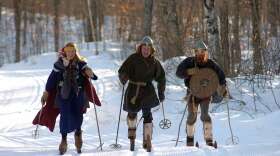It was not long ago that the national narrative surrounding Detroit was overwhelmingly - almost universally - negative. The city was bankrupt, the school system had failed, the downtown core was practically emptied.
But things have begun to improve, led by creative entrepreneurs and others who see Detroit as something of a blank slate. One of the key people involved in that effort is James Feagin, through his work as a consultant with the nonprofit Detroit Economic Growth Corporation.
"As we start to re-look at some of the same things we had before - a vacant property is no longer blight, it's opportunity." - James Feagin
"There's a tremendous opportunity in Detroit now," he says, pointing to half-million dollar cash deals that result in new living spaces carved out of abandoned factories and industrial space. Still, he says, "there are 142 square miles that are great land, and great assets, and as we start to re-look at some of the same things we had before - a vacant property is no longer blight, it's opportunity."
The important lesson, Feagin believes, was bringing people together from around the city to do something. "That's the biggest thing we've bridged," he says. "Fifteen years ago, if you were in the suburbs - white or black - you weren't thinking about Detroit as where to go when you graduated from college, let alone high school." Today, he says, the pieces are coming together - and the city's Wayne State University is a "major economic engine" that is spurring growth around it.
At least one Milwaukee organization believes it has much to learn from Feagin's and Detroit's experience. The Riverworks Center is a collaborative of two organizations on Milwaukee's northeast side, an area devastated with the loss of industrial jobs. Feagin is serving as the keynote speaker for the group's Riverworks Week.
"We are in a wealth of different populations and different resources," says Carl Nilssen, board chair of the Riverworks Business Improvement Districts. Like downtown Detroit, he says, "we are left with an older industrial park with an inventory of buildings that are perfectly suited for the creative class." Nilssen says the district is on the verge of what parts of Detroit have experienced - developing a neighborhood that allows walking or biking to work. But he says connectivity is vital to the effort.
And that's where Feagin believes Detroit is ahead of the curve. "When you look, historically, Detroit has always been first," he says. "We were the first to hit the decline, and [now] the first to figure out how to rebuild the American city. And as we're figuring it out, we are able to build different models.
"I don't want to say we have nothing to lose," Feagin says, "but we understand that the status quo is unacceptable better than anyone else."





